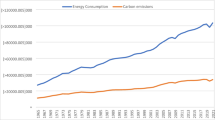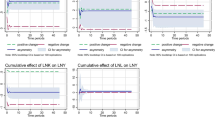Abstract
This paper investigates the impact of geopolitical risks on renewable energy generation in MENAT oil-importing countries, namely, Egypt, Tunisia, and Turkey over the period 1990–2020 using the autoregressive distributed lag (ARDL) model. The main findings emphasize that geopolitical risks play a crucial role in inducing renewable energy development in MENAT oil-importing countries in the short and long run. Financial development appears to positively and significantly affect renewable energy generation in the three countries. Furthermore, the speeds of adjustment towards the long-run equilibrium are 36.78%, 66.03%, and 17.81% annually in Egypt, Tunisia, and Turkey, respectively. In today’s volatile and turbulent world, dramatically rising geopolitical risks make the transition to renewable energy an inevitable reality. Consequently, it is incumbent upon policymakers and relevant authorities in MENAT oil-importing countries to preemptively redirect their efforts and strategies to conform to the demands of the inevitable transition to renewable energy sources and boost energy self-reliance.

Similar content being viewed by others
Data availability
Data and material will be made available upon request.
Notes
MENAT refers to the Middle East, North Africa, and Turkey region.
References
Abban AR, Hasan MZ (2021) Revisiting the determinants of renewable energy investment-new evidence from political and government ideology. Energy Policy 151:112184
Adun H, Ishaku HP, Ogungbemi AT (2022) Towards renewable energy targets for the Middle East and North African region: a decarbonization assessment of energy-water nexus. J Clean Prod 374:133944
Aguirre M, Ibikunle G (2014) Determinants of renewable energy growth: a global sample analysis. Energy Policy 69:374–384
Akaike H (1974) A new look at the statistical model identification. IEEE Trans Autom Control 19(6):716–723
Alsagr N, van Hemmen S (2021) The impact of financial development and geopolitical risk on renewable energy consumption: evidence from emerging markets. Environ Sci Pollut Res 28(20):25906–25919
Anser MK, Syed QR, Apergis N (2021) Does geopolitical risk escalate CO2 emissions? Evidence from the BRICS countries. Environ Sci Pollut Res 28(35):48011–48021
Antonakakis N, Chatziantoniou I, Filis G (2017) Oil shocks and stock markets: dynamic connectedness under the prism of recent geopolitical and economic unrest. Int Rev Financ Anal 50:1–26
Appiah-Otoo I (2021) Impact of economic policy uncertainty on renewable energy growth. Energy Res Lett 2(1)
Belaïd F (2022) Mapping and understanding the drivers of fuel poverty in emerging economies: the case of Egypt and Jordan. Energy Policy 162:112775
Bera AK, Jarque CM (1981) Efficient tests for normality, homoscedasticity and serial independence of regression residuals: Monte Carlo evidence. Econ Lett 7(4):313–318
Bourcet C (2020) Empirical determinants of renewable energy deployment: a systematic literature review. Energy Econ 85:104563
Breusch TS (1978) Testing for autocorrelation in dynamic linear models. Aust Econ Pap 17(31):334–355
Brooks C (2014) Introductory econometrics for finance, 3rd edn. Cambridge University Press
Brooks, C., 2008. Introductory econometrics for finance. Cambridge University Press, 2a Upplagan
Brown RL, Durbin J, Evans JM (1975) Techniques for testing the constancy of regression relationships over time. J R Stat Soc Series B Stat Methodol 37(2):149–163
Cai Y, Wu Y (2021) Time-varying interactions between geopolitical risks and renewable energy consumption. Int Rev Econ Financ 74:116–137
Caldara D, Iacoviello M (2018) Measuring geopolitical risk. International Finance Discussion Papers, 1222
Caldara D, Iacoviello M (2022) Measuring geopolitical risk. Am Econ Rev 112(4):1194–1225
Darmani A, Arvidsson N, Hidalgo A, Albors J (2014) What drives the development of renewable energy technologies? Toward a typology for the systemic drivers. Renew Sust Energ Rev 38:834–847
Dutta A, Dutta P (2022) Geopolitical risk and renewable energy asset prices: implications for sustainable development. Renew Energy 196:518–525
Engle RF, Granger CW (1987) Co-integration and error correction: representation, estimation, and testing. Econometrica:251–276
Engle RF (1982) Autoregressive conditional heteroscedasticity with estimates of the variance of United Kingdom inflation. Econometrica:987–1007
Flouri M, Karakosta C, Kladouchou C, Psarras J (2015) How does a natural gas supply interruption affect the EU gas security? A Monte Carlo simulation. Renew Sust Energ Rev 44:785–796
Flouros F, Pistikou V, Plakandaras V (2022) Geopolitical risk as a determinant of renewable energy investments. Energies 15(4):1498
Godfrey LG (1978) Testing for higher order serial correlation in regression equations when the regressors include lagged dependent variables. Econometrica 46:1303–1310
Gori F, Menkulasi J (2022) As commodity prices surge again, MENA countries can draw lessons from the past. December 7, 2022, https://www.imf.org/en/News/Articles/2022/12/06/cf-as-commodity-prices-surge-again-mena-countries-can-draw-lessons-from-the-past
Gujarati DN (2004) Basic Econometrics. Mc Graw Hills Pub, Co, New York
Hill RC, Griffiths WE, Lim GC (2018) Principles of econometrics. John Wiley & Sons
Hubbard B (2021) Syria’s surprising solar boom: sunlight powers the night in Rebel Idlib, The New York Times May 15, 2021, https://www.nytimes.com/2021/05/15/world/middleeast/syria-solar-power-idlib.html#:~:text=Syria%20Dispatch-,Syria's%20Surprising%20Solar%20Boom%3A%20Sunlight%20Powers%20the%20Night%20in%20Rebel,light%20their%20homes%20and%20tents
IMF (2022) IMF Staff Completes 2022 Article IV Mission to Türkiye. November 4, 2022, https://www.imf.org/en/News/Articles/2022/11/04/pr22372-turkiye-imf-staff-completes-2022-article-iv-mission-to-turkiye
IMF (2023) IMF regional economic outlook, Middle East and Central Asia: safeguarding macroeconomic stability amid continued uncertainty. IMF, Washington, DC
International Energy Agency (IEA) (2022) How Europe can cut natural gas imports from Russia significantly within a year. https://www.iea.org/news/how-europe-can-cut-natural-gas-imports-from-russia-significantly-within-a-year. Accessed on 19 Jul 2023
Jarque CM, Bera AK (1980) Efficient tests for normality, homoscedasticity and serial independence of regression residuals. Econ Lett 6(3):255–259
Johansen S, Juselius K (1990) Maximum likelihood estimation and inference on cointegration-with appucations to the demand for money. Oxf Bull Econ Stat 52(2):169–210
Johansen S (1988) Statistical analysis of cointegration vectors. J Econ Dyn Control 12(2-3):231–254
Johansen S (1991) Estimation and hypothesis testing of cointegration vectors in Gaussian vector autoregressive models. Econometrica:1551–1580
Kahia M, Aïssa MSB, Lanouar C (2017) Renewable and non-renewable energy use-economic growth nexus: the case of MENA net oil importing countries. Renew Sust Energ Rev 71:127–140
Khan A, Chenggang Y, Hussain J, Kui Z (2021) Impact of technological innovation, financial development and foreign direct investment on renewable energy, non-renewable energy and the environment in belt & Road Initiative countries. Renew Energy 171:479–491
Li S, Tu D, Zeng Y, Gong C, Yuan D (2022) Does geopolitical risk matter in crude oil and stock markets? Evid Disaggreg Data Energy Econ 113:106191
Liu J, Ma F, Tang Y, Zhang Y (2019) Geopolitical risk and oil volatility: a new insight. Energy Econ 84:104548
Mei D, Ma F, Liao Y, Wang L (2020) Geopolitical risk uncertainty and oil future volatility: evidence from MIDAS models. Energy Econ 86:104624
Overland I (2019) The geopolitics of renewable energy: debunking four emerging myths. Energy Res Soc Sci 49:36–40
Panarello D, Gatto A (2023) Decarbonising Europe–EU citizens’ perception of renewable energy transition amidst the European Green Deal. Energy Policy 172:113272
Pesaran MH (2015) Time series and panel data econometrics. Oxford University Press
Pesaran MH, Shin Y, Smith RJ (1996) Testing for the existence of a long-run relationship. DAE Working Paper No. 9622. Department of Applied Economics, University of Cambridge
Pesaran MH, Shin Y, Smith RJ (2001) Bounds testing approaches to the analysis of level relationships. J Appl Econ 16(3):289–326
Pesaran MH, Shin Y, Smith RP (1999) Pooled mean group estimation of dynamic heterogeneous panels. J Am Stat Assoc 94(446):621–634
Pfeiffer B, Mulder P (2013) Explaining the diffusion of renewable energy technology in developing countries. Energy Econ 40:285–296
Ramsey JB (1969) Tests for specification errors in classical linear least-squares regression analysis. J R Stat Soc Series B Stat Methodol 31(2):350–371
Razi F, Dincer I (2022) Renewable energy development and hydrogen economy in MENA region: a review. Renew Sust Energ Rev 168:112763
Rodríguez-Fernández L, Carvajal ABF, Ruiz-Gómez LM (2020) Evolution of European Union’s energy security in gas supply during Russia-Ukraine gas crises (2006-2009). Energ Strat Rev 30:100518
Scholten D (2018) The geopolitics of renewables—an introduction and expectations. In: The geopolitics of renewables. Springer, Cham, pp 1–33
Şener ŞEC, Sharp JL, Anctil A (2018) Factors impacting diverging paths of renewable energy: a review. Renew Sust Energ Rev 81:2335–2342
Shahbaz M, Topcu BA, Sarıgül SS, Vo XV (2021) The effect of financial development on renewable energy demand: the case of developing countries. Renew Energy 178:1370–1380
Smales LA (2021) Geopolitical risk and volatility spillovers in oil and stock markets. Q Rev Econ Finance 80:358–366
Su CW, Khan K, Umar M, Zhang W (2021) Does renewable energy redefine geopolitical risks? Energy Policy 158:112566
Sweidan OD (2021a) The geopolitical risk effect on the US renewable energy deployment. J Clean Prod 293:126189
Sweidan OD (2021b) Is the geopolitical risk an incentive or obstacle to renewable energy deployment? Evidence from a panel analysis. Renew Energy 178:377–384
Timmerberg S, Sanna A, Kaltschmitt M, Finkbeiner M (2019) Renewable electricity targets in selected MENA countries–assessment of available resources, generation costs and GHG emissions. Energy Rep 5:1470–1487
Tuathail GÓ, Dalby S, Routledge P (eds) (1998) The geopolitics reader. Routledge, London
Uddin GS, Rahman ML, Hedström A, Ahmed A (2019) Cross-quantilogram-based correlation and dependence between renewable energy stock and other asset classes. Energy Econ 80:743–759
Umar M, Riaz Y, Yousaf I (2022) Impact of Russian-Ukraine war on clean energy, conventional energy, and metal markets: evidence from event study approach. Res Policy 79:102966
World Bank (2022a) Boosting access to affordable solar energy in Yemen. July 18, 2022, https://www.worldbank.org/en/results/2022/07/18/-boosting-access-to-affordable-solar-energy-in-yemen
World Bank (2022b) Somalia’s businesses tap solar energy to expand, boosting economic growth. May 6, 2021. https://www.worldbank.org/en/news/feature/2021/05/06/somalia-s-businesses-tap-solar-energy-to-expand-boosting-economic-growth#:~:text=The%20World%20Bank's%20Somalia%20Electricity,%2Dpowered%20hybrid%20mini%2Dgrids
World Bank (2017) Maximizing finance for development stories: Arab Republic of Egypt, providing affordable clean energy. World Bank, Washington, DC
World Bank (2022c) Unlocking green finance in Turkey. World Bank, Washington, DC
World Bank (2023a) Reliable and Affordable Access to Clean Energy for 2.25 Million Households in Egypt. World Bank, Washington, DC
World Bank (2023b) Tunisia: reforming energy subsidies to enhance economic resilience. World Bank, Washington, DC
World Bank (2023c) World Bank approves $268 million project linking Tunisia’s energy grids with Europe. World Bank, Washington, DC
World Bank (2023d) World Bank approves $549 million for increasing use of renewable energy in public buildings in Türkiye. World Bank, Washington, DC
Xiao J, Wen F, He Z (2022) Impact of geopolitical risks on investor attention and speculation in the oil market: evidence from nonlinear and time-varying analysis. Energy 267:126564
Zhang Y, He J, He M, Li S (2022) Geopolitical risk and stock market volatility: a global perspective. Financ Res Lett 53:103620
Zhou XY, Lu G, Xu Z, Yan X, Khu ST, Yang J, Zhao J (2023) Influence of Russia-Ukraine war on the global energy and food security. Resour Conserv Recycl 188:106657
Acknowledgements
The authors would like to express their sincere appreciation and thanks to the Editor Pr. Roula Inglesi-Lotz and anonymous referees for their helpful comments and suggestions that have greatly helped to improve the paper.
Author information
Authors and Affiliations
Contributions
Siham Matallah (the corresponding author): supervision, conceptualization, methodology, software, validation, formal analysis, data curation, writing—original draft, writing—review and editing, visualization. Amal Matallah: methodology, software, validation, formal analysis, data curation, writing—review and editing. Nathalie HILMI: review and editing.
Corresponding author
Ethics declarations
Ethical approval and consent to participate
The authors declare that this study does not involve human participants, human data, or human tissue.
Consent for publication
The authors declare that they do not have any individual’s personal data in any form.
Competing interests
The authors declare no competing interests.
Additional information
Responsible Editor: Roula Inglesi-Lotz
Publisher’s Note
Springer Nature remains neutral with regard to jurisdictional claims in published maps and institutional affiliations.
Appendices
Appendix 1
The sample of countries under study. Source: https://www.mapchart.net/
Appendix 2
Rights and permissions
Springer Nature or its licensor (e.g. a society or other partner) holds exclusive rights to this article under a publishing agreement with the author(s) or other rightsholder(s); author self-archiving of the accepted manuscript version of this article is solely governed by the terms of such publishing agreement and applicable law.
About this article
Cite this article
Matallah, S., Matallah, A. & Hilmi, N. The transition to renewable energy is inevitable as geopolitical risks drag on: a closer empirical look at MENAT oil importers. Environ Sci Pollut Res 30, 105293–105307 (2023). https://doi.org/10.1007/s11356-023-29823-9
Received:
Accepted:
Published:
Issue Date:
DOI: https://doi.org/10.1007/s11356-023-29823-9





